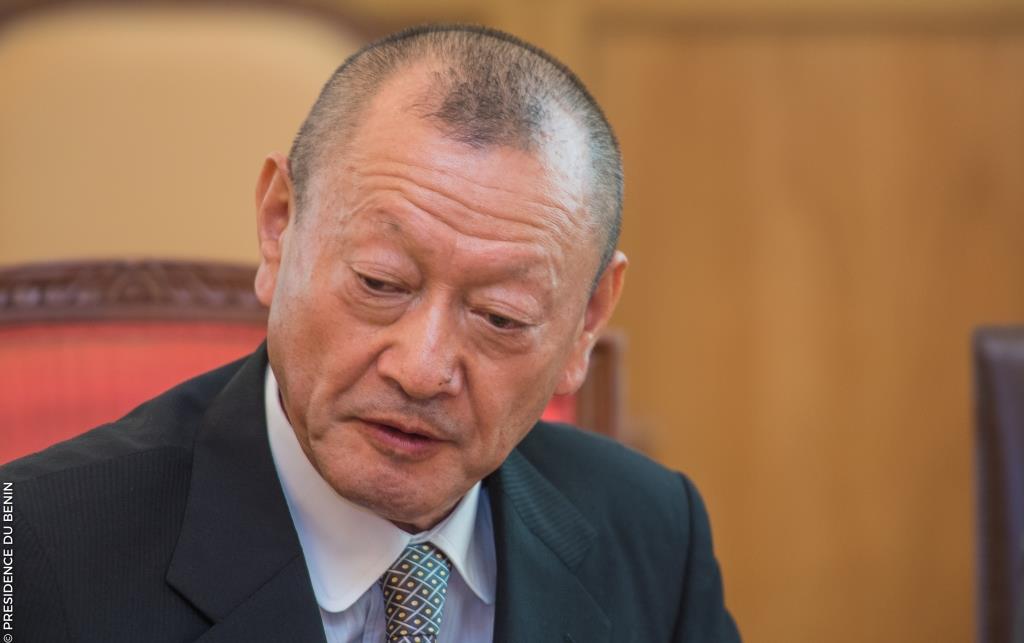Connecting Japan and Africa with economics, culture and dreams
About AFRECO
In the 1960s, many African countries became independent and tried to be economically self-sufficient by utilizing their abundant natural resources. While they demanded investments and technologies from the other countries, Japan was experiencing rapid economic growth and was attracted by the African great natural resources. Under the circumstances, the Association of African Economic and Development Japan (AFRECO) was established by influential political and financial circles in 1970 to promote economic cooperation among Japan and African countries.
AFRCO is to deepen economic and cultural exchanges, nurture the friendship between African countries and Japan, and contribute to mutual prosperity. AFRECO focuses on cooperating economic activities at the grassroots level and on creating projects in African countries that could have economic impacts on the Japanese government and corporations.

With President Ramaphosa of the Republic of South Africa
Information
- 2026年2月12日InformationMeeting with the Ambassador of United Republic of Tanzania 2026-02-10
- 2026年2月10日InformationMeeting with the Ambassador of Republic of Cameroon and Ambassador of Republic of Cote d’Ivoire 2026-02-10
- 2026年2月10日InformationMeeting with the Ambassador of Republic of Malawi 2026-02-10
- 2026年2月10日InformationMeeting with the Ambasador of Republic of Ghana 2026-02-10
- 2026年2月3日InformationSouth African Wine Event 2026-02-02
- 2026年1月21日InformationTunisian Olive Oil Seminar 2026-01-20
- 2026年1月20日InformationMeeting with the Tunisian Ambassador 2026-01-16
- 2025年12月17日InformationMeeting with the Secretary General of SADC 2025-12-10
- 2025年12月17日InformationParticipation in the GPE and University of Tokyo CASEER Co-hosted Event 2025-12-10
- 2025年11月18日InformationCongratulations Vice President Mashiko 2025-11-18
Greetings
TICAD9 was held in Yokohama from August 20 to 22, 2025, under the theme "Co-create innovative solutions with Africa."
Looking back over TICAD's history spanning more than 30 years, Japan has consistently worked as a partner with African nations on development, always on equal footing. During this time, the needs expressed by African countries have changed significantly, and I often sense that the era of aid has passed, and we have entered an era of investment. Business exchanges flourished at this TICAD as well, with over 300 MOUs reportedly signed. Nevertheless, to support these businesses and guide them toward sustainable success, foundational infrastructure, basic education, and fundamental healthcare services accessible to all Africans remain insufficient. The Association of African Economy & Development (AFRECO) held two seminars at TICAD9 on healthcare and basic education; both were nearly full, indicating high interest. Business alone may not yet make Japan a good partner for Africa.
I am grateful that member companies and individuals from diverse fields support AFRECO's operations, which include construction, academia, healthcare, consulting, finance, power industry, and more – truly a wide range. At this TICAD, where the business focus grew even stronger, I reaffirmed that AFRECO has two key roles to help our members succeed in Africa.
First, I need to strengthen connections between member companies and individuals across sectors. Entering Africa solely within one's own field presents significant hurdles. It holds for many developing nations advancing their development now, as they must simultaneously address various challenges—such as sustainability, improving the natural environment, and reducing disparities—beyond just pursuing development. AFRECO may be called upon to connect members more effectively and initiate "co-creation" than ever.
The other is the need for activities that encourage support for the provision of basic infrastructure, basic education, and fundamental healthcare services across all of Africa. AFRECO members need to be able to dedicate themselves to their business in Africa fully. To do so, support from the member companies is necessary, but advocacy and lobbying efforts directed at governments are also indispensable.
Focusing on supporting business development and promoting improvements in social life in Africa, I will strive with all my strength until the commemorative 10th TICAD.
Tetsuro Yano,President of AFRECO








